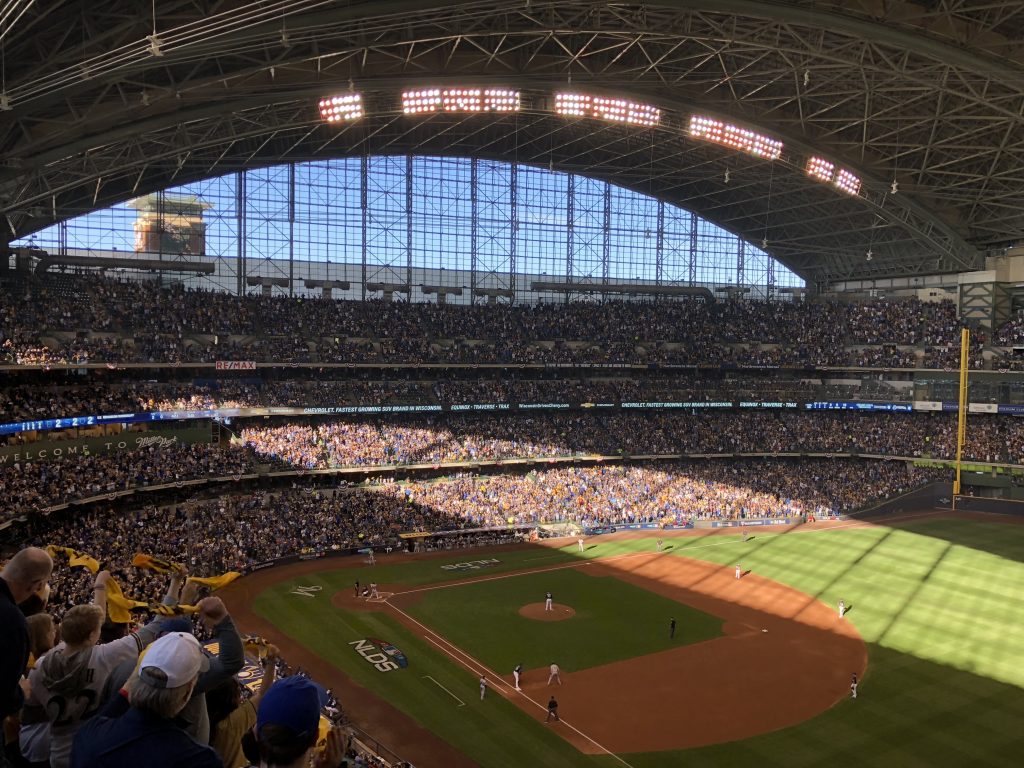Sheehy Says Local Sales Tax Must Help Fund Brewers’ Stadium
Some of new city and county sales tax must be spent on the team, business leader says.

American Family Field. Photo by Jeramey Jannene.
The Chairman of the opaque board managing the Milwaukee Brewer’s stadium district recently said revenue from the new sales tax enacted by the City of Milwaukee and Milwaukee County will need to be part of a deal to keep the baseball team in Milwaukee.
Tim Sheehy, chairman of the Southeast Wisconsin Professional Baseball Park District and president of the powerful local Metropolitan Milwaukee Association of Commerce (MMAC), wrote in an Op-Ed for the Milwaukee Business Journal declaring that using a portion of the new city and county sales tax revenue “is the basis for a state/local bi-partisan solution to signing the Brewers to a generational lease extension, along with the team kicking in its share.”
Local leaders, including Sheehy, had for years advocated for the sales tax on the grounds it would stave off financial disaster and allow the city and the county to invest in government services.
A spokesperson for County Executive David Crowley said Democratic leadership asked the county for examples of what a local contribution could look like. “We proposed technical changes to Act 12 language (same language we proposed during the negotiation period) to allow us to use sales tax dollars to further reduce our structural deficit and provide more financial flexibility for Milwaukee County period,” said Brandon Weathersby, Crowley’s director of communications.
So while the state wants a local contribution to the stadium district, Crowley’s team is saying the county needs the ability to use the sales tax to directly pay off some of the county’s unfunded pension liability. “We have not proposed using sales tax dollars for [stadium] renovations,” he said.
The county’s structural deficit is the gap between how much it costs to maintain the government and how much revenue the government takes in. For years, this deficit has forced county officials to shave money off the annual budget wherever possible. A major contributor to the deficit has been the county’s pension system, which will also be slow-walked to closure over the next three decades.
The new sales tax revenue is limited, by state law, to be used for paying down the county’s pension bonds. But it frees up tax revenue that was previously used to pay down those pension costs.
Sheehy and the MMAC were major players in a private and non-profit sector coalition that lobbied for the sales tax. “New sales tax revenue for the city of Milwaukee and Milwaukee County, coupled with an increase in state-shared revenue, is a clear-and-present solution to the fiscal cliff both bodies were facing if nothing had been done,” Sheehy said in June. “These new streams of revenue provide the region fiscal solvency and make it more attractive to potential residents and businesses looking to make a move.”
Sup. Sheldon Wasserman, who was in the state Legislature when the Brewers stadium sales tax was passed, told Urban Milwaukee in June he was concerned the state would force the county to relinquish some of its new revenue, at the time still hypothetical, for a stadium deal. Wasserman was skeptical that state-level Republicans would allow Milwaukee to keep all of its revenue. The supervisor has repeatedly stated that the original sales tax for the Brewers stadium shouldn’t have been repealed in the first place.
The Brewers’ stadium district was created by the state as part of the financing for the stadium passed in 1996. The district’s board handled oversight and management of the revenue generated by a five-county 0.1% stadium sales tax. To date, the tax has raised $609 million to pay for construction of the stadium and ongoing repairs and maintenance, but the total subsidy for the stadium including all tax exemptions has totaled $1.5 billion as Urban Milwaukee has reported. The stadium sales tax was dropped in 2020, and now the Brewers are seeking a new subsidy to fund repairs and improvements.
Gov. Tony Evers had crafted a proposal to use the massive state surplus to make an upfront payment of $290 million which would grow with interest, but Republican legislators condemned the deal, with Assembly Speaker Robin Vos contending that any deal must include funding from Milwaukee taxpayers. Now Sheehy is trying to sell that approach.
Sheehy said the district’s reserves have enough to pay for approximately $3.2 million a year in maintenance until the end of the current lease.
“But the Milwaukee Brewers are now interested in a ‘generational lease extension,’ well beyond 2040, and well beyond the effective end of the current lease in 2030,” Sheehy wrote in his op-ed. “Just as you would think differently about putting a new roof on your house if you were staying another 20 years, there is a need to think differently about the capital improvements to keep American Family Field in top shape well beyond 2040.”
The cost of this “generational lease extension,” Sheehy says, is $24 million a year in upgrades and capital improvements. The chairman noted that baseball at the stadium generates approximately $25 million in sales and income tax every year, “and with the new city and county sales tax, local tax collections will also increase.”
The Brewers have been on a lobbying blitz to secure a subsidy. Major League Baseball Commissioner Robert Manfred joined the push earlier this year, warning that without a deal the Brewers could leave.
But public subsidies for private sports has long been unpopular among voters. And local Milwaukee leaders like Crowley and Mayor Cavalier Johnson just pulled off a political coup, as first-term executives negotiating additional revenue for Milwaukee with the Republican-controlled Legislature. Crowley signed a resolution passed this spring by the Milwaukee County Board that unequivocally opposes using county funds to subsidize improvements or maintenance at American Family Field.
While Sheehy’s op-ed was published by the Business Journal, it was addressed to elected officials. He closed it off saying, “To the Governor, Legislature, Mayor, and County Executive, stay in the batter’s box and swing for our future.”
If you think stories like this are important, become a member of Urban Milwaukee and help support real, independent journalism. Plus you get some cool added benefits.
More about the Miller Park Stadium Tax
- Stadium Authority Seeks Study to Redevelop Brewers Parking Lots - Jeramey Jannene - May 28th, 2025
- $54.9 Million in Upgrades Approved for Brewers Stadium - Evan Casey - Jan 28th, 2025
- MKE County: Brewers Ballpark Subsidy Stings County Budget - Graham Kilmer - Jul 28th, 2024
- Governor Signs Brewers Subsidy Agreement At American Family Field - Evan Casey - Dec 5th, 2023
- Gov. Evers Signs Bills to Keep Milwaukee Brewers, Major League Baseball in Wisconsin Through 2050 - Gov. Tony Evers - Dec 5th, 2023
- Council, Mayor Bickered On Brewers Deal - Jeramey Jannene - Nov 29th, 2023
- Brewers Stadium Deal Passes the Legislature - Shawn Johnson - Nov 14th, 2023
- County Executive David Crowley’s Statement on Bipartisan Bill to Keep Brewers in Milwaukee - County Executive David Crowley - Nov 14th, 2023
- Gov. Evers to Sign Bipartisan Plan to Keep Milwaukee Brewers, Major League Baseball in Wisconsin Through 2050 - Gov. Tony Evers - Nov 14th, 2023
- A swing, a miss, and an errant bat in the stands - State Sen. Chris Larson - Nov 14th, 2023
Read more about Miller Park Stadium Tax here
Political Contributions Tracker
Displaying political contributions between people mentioned in this story. Learn more.
- December 28, 2020 - Cavalier Johnson received $400 from Tim Sheehy
- October 15, 2015 - Cavalier Johnson received $100 from Sheldon Wasserman
- August 13, 2015 - Cavalier Johnson received $25 from David Crowley
MKE County
-
Ron Johnson Says Free-Market Principles Could Fix Education
 Jul 17th, 2024 by Graham Kilmer
Jul 17th, 2024 by Graham Kilmer
-
RNC Will Cause Some County Services To Be Moved to Wauwatosa
 Jul 12th, 2024 by Graham Kilmer
Jul 12th, 2024 by Graham Kilmer
-
Hank Aaron State Trail Will Be Closed For RNC, State Fair
 Jul 12th, 2024 by Graham Kilmer
Jul 12th, 2024 by Graham Kilmer






















Does anyone care what Tim Sheehy thinks? I know I don’t. He does not live in Milwaukee. He and his friends have been behind the constant economic attacks on the city and county for many years. Where was he when Vos and friends made this budget “offer” to the city by the legislature? It was a kind of Don Corleone deal. He was silent.
Make the rest of the Milwaukee metro pay like they did before 2020. How many regular game attendees come from Ozaukee, Washington, Waukesha, and Racine counties? They benefit from having the team here, so they should pay too. Or the state can make a contribution from the surplus that the GOP wanted to give to millionaires.
enough already with funding the stadium with taxpayers dollars. have the brewers help fund their stadium. are the owners making money? do we need to pay sport players millions and millions of dollars? enough.
The team should be owned by the public if they expect the voters to subsidize their expenses.
How to become a billionaire? Never pay for anything. Finagle the taxpayers to do it. (The billionaire owners of the Bucks do it, too.)
How about adding an additional fee on all parking and game tickets to help fund the stadium?
Outside of the players and the Brewer’s staff, most any job created with attendance, restaurants, or hotels is just above minimum wage. The economic loss for the area would be minimal if the Brewers left.
If suggestions #’d 2, 4, & 6 or some combination of them
aren’t accepted, let the Brewers leave.
Turn the stadium into a year-round, high-output,
flexible garden. Use the closable roof for hail, deluge
and frost protection. Swap out the lights for grow lights.
Multitier the field.
Remove all the seats, replace them with rows of movable
containers full of turbocharged soil using biochar and mycelium.
Dedicate about every 3rd row to infrastructure for mechanical
placement and removal of containers and for customized,
programmed watering, fertilizing, cultivating operations.
Establish or place beehives (on the columns?).
Planting and harvesting would be done elsewhere
to maximize growing time.
Crops would be chosen for local use or export value,
continuity of supply of seasonal produce,
or medicinal or scientific needs.
With its large volume, the garden would require
solar, wind power and heat pump energy augmentation.
Lots of space available for that.
In winter, more tiered gardening would maximize
available volume.
Good news – good jobs.
Bad news – not on a bus route.
Who knows, maybe if 5 counties battle for rights
to output/income we’ll also have a useful lab experiment
in government cooperation. Or not.
Maybe it’ll be the lab that grows into a botanical & agricultural
science center.
It’s bad enough that we’re stuck with this new sales tax (make the poor pay) when the state has that giant surplus. The GOP attached all sorts of stings to that sales tax money, particularly benefitting the police union. Now the Republicans’ cronies what to force us to bail out the Brewers as well with that money. I think the public would prefer it be spent on parks… Not the ball park. Put it to a public vote… It will tank.
Former Gov Tommy Thompson said, “Stick it to Milwaukee.” He was up north discussing where tax funding to build the Stadium,
He knew it was corporate welfare!
We paid for decades, years beyond initial plan.
Bud Selig, former Brewers owner, sold the team. He profited mightily due to newer Stadium.
Now we’re coerced by the Republican Legislature to maintain it. Paraphrasing Thompson’s quote: “Stick it some where else.”